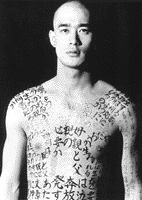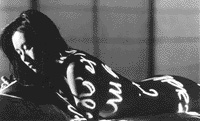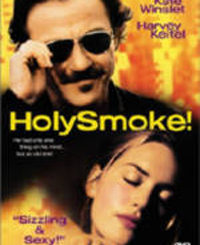 The Pillow Book
The Pillow Book
with Vivian Wu, Ewan McGregor, Yoshi Oida
Written by Sei Shonagon
Directed by Peter Greenaway
by Adam Haynes
If you are of the 90% of the supposed 24% of our population who actually attends movies on a regular basis, then there are two possible reasons as to why you might hate filmmaker Peter Greenaway. The 75% of you 90% who only go to see the BIG studio pictures at the major theaters (feeding time = summer and Christmas) hate Peter Greenaway because your art-fag kid brother who goes to Bard rented and made you sit through The Cook, The Thief, His Wife And Her Lover, or A Zed And Two Naughts, or The Draughtsman’s Contract, or Drowning By Numbers, or Prospero’s Books, or The Belly of an Architect, and even though the sensationally-exploitative sex and violence was certainly at times comparable with anything put out recently by Paul Verhoeven, the rest reeked of the irritating sort of weirdness which just does not combine properly with a palate weaned on beer and pretzels. Now, if you are among the other 15% who prefer a diet more of the wine and cheese variety and propagate the art houses of college towns and metropolitan centers (mostly during the fall and late winter), then you hate Peter Greenaway because when you watch his movies you expect to see the usual art-house formula which in some way or another pokes (usually easy) fun at the status quo (Bob Roberts,Trainspotting, etc.) but instead are subjected to Greenaway product which makes targets of the art-house crowd themselves, usually in the form of very disgusting subject matter (cannibalism, rotting, etc). This guarantees that, whatever your diet, a Greenaway movie is never easy to swallow.
Naturally in Europe they think he’s dandy, since this is where he receives funding. In his native England, as well as on the continent, there are those who consider Greenaway a real artist. Those who don’t keep their distance.
 In person, Greenaway is pompous but extremely amiable – something which runs counter to the spin his PR usually puts out (they paint him up as an austere intellectual of the Teutonic variety). He does see himself as a genius, but more than that, as a pioneer. He thinks the medium of film is the most powerful and expressive artistic discipline (he also paints and writes) there is which has yet to be taken advantage of in a “post-modern,” or even “modern” way (grudgingly he admits possibly Von Trier, possibly Lynch as peers). So basically he wants to be the James Joyce of current cinema (or better yet, the John Cage), expanding the boundaries of stories while experimenting with the narrative techniques used to convey these stories. His biggest gripe with current cinema, he says, is that it can always be deconstructed back to literature. The cinema of the future, the cinema which Peter Greenaway is single-handedly creating, works to eschew literary narrative all together for something that comes closer to pure visual expression, eventually becoming CD-ROM merged with an IMAX-like viewing environment. Alas, like most great pioneers (in this sense he compares himself to DaVinci and Gance), the tech has yet to meet the needs of the intellect. For now he must make do with what’s about.
In person, Greenaway is pompous but extremely amiable – something which runs counter to the spin his PR usually puts out (they paint him up as an austere intellectual of the Teutonic variety). He does see himself as a genius, but more than that, as a pioneer. He thinks the medium of film is the most powerful and expressive artistic discipline (he also paints and writes) there is which has yet to be taken advantage of in a “post-modern,” or even “modern” way (grudgingly he admits possibly Von Trier, possibly Lynch as peers). So basically he wants to be the James Joyce of current cinema (or better yet, the John Cage), expanding the boundaries of stories while experimenting with the narrative techniques used to convey these stories. His biggest gripe with current cinema, he says, is that it can always be deconstructed back to literature. The cinema of the future, the cinema which Peter Greenaway is single-handedly creating, works to eschew literary narrative all together for something that comes closer to pure visual expression, eventually becoming CD-ROM merged with an IMAX-like viewing environment. Alas, like most great pioneers (in this sense he compares himself to DaVinci and Gance), the tech has yet to meet the needs of the intellect. For now he must make do with what’s about.
Which is not to say that the stories themselves will get any less complicated. Greenaway is notorious for loading his films with so many themes, symbols, references, ideas, in-jokes, metaphors, and metaphoric red herrings, on so many different levels, it’s no wonder his core audience of voyeuristic masochists is so small. Greenaway claims he is simply making movies about what interests him. In defense of the intellectual overkill he contends altruistically, if there are a hundred such things in one of his movies, then the audience has a chance of getting say, sixty of them. Despite such offerings of kind intention, the other Greenaway message is clear too: if my movies make you feel stupid that’s because you are stupid and I will continue to make you feel stupid until you stop watching my movies. Of course, the fewer people understand his movies, the more reinforced his own artistic success, after all, didn’t his mentors like Cage thrive on being misunderstood?
And, of course, the moment I saw his new movie, The Pillow Book, I realized that more than anything else, Greenaway is completely full of shit. I’m not saying there aren’t mountains of deep meaning in this film or his others, and I’m not saying he isn’t a very serious-minded filmmaker. Simply that the statements which are communicated on screen fall very short of the complicated ones Greenaway postulated during his press meeting.
Like all of Greenaway’s films,The Pillow Book is about art, bodily functions, and disgust with sex. There is a Japanese woman living in Hong Kong who is obsessed with having calligraphy painted on her naked body. A few hundred thousand overlapping references later, she decides she will now paint calligraphy on the naked bodies of men, most notably Ewan McGregor (whose penis should have received separate billing after all those close ups). Toward the end, a main character dies tragically and is then skinned to preserve the beautiful writing covering their skin.
The problem with The Pillow Book is that while all of the extremely highbrow themes of how we relate to art, organic vs. structural, and the cycles of creativity are all solidly there, Greenaway is simply not a very gifted filmmaker when it comes to the mechanics of telling stories. He never has been. This is the difference between slow and banal. Currently his idea of expanding the narrative of cinema seems to have something to do with using HDTV editing technology (which he also employed on Prospero’s Books) to overlap the same image at different focal lengths and dribble the screen with different-colored Eastern and Western text. Which isn’t to say that it doesn’t look cool and sometimes even beautiful, but inevitably it’s just window dressing. If there is a deconstruction of classical narrative here, MTV is more post-modern than I thought.



